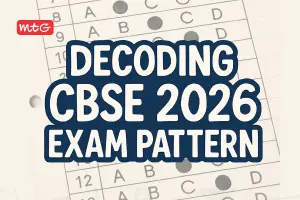
The Central Board of Secondary Education (CBSE) recently announced changes to the board exam pattern for 2023-2024, with a greater emphasis on competency-based questions and multiple-choice questions (MCQs). While the move has been hailed as a step in the right direction towards transforming the education system in India, some school principals in Delhi have expressed concerns that the changes may impact students’ learning.
According to reports, some school principals in Delhi have raised concerns that the new exam pattern is motivated to prepare students for competitive exams such as the Joint Entrance Examination (JEE) and the National Eligibility cum Entrance Test (NEET). They argue that long answers type questions should also have weightage as they test real expression of learning.
However, it is important to note that the new exam pattern is aligned with the National Education Policy 2020, which emphasizes the need for competency-based learning and practical skills. The NEP 2020 recognizes the limitations of the traditional exam pattern and calls for a shift toward competency-based learning, which is more relevant to the real world and prepares students for the challenges of the future.
Important – CBSE Syllabus 2023-24 – Major Changes in NCERT Textbooks after 19 Years!
Moreover, it is important to recognize that entrance exams are not the only measure of academic success. While they are important for admission to higher education institutions, they do not necessarily reflect a student’s overall academic ability or potential.
Furthermore, it is worth noting that CBSE has stated that the question papers will be designed to assess higher-order thinking skills, such as analysis, evaluation, and synthesis. This will require students to not just memorize facts and figures but to understand the underlying concepts and apply them to solve problems. This will better prepare students for entrance exams that test their ability to analyze, interpret and apply information.
What are Competency-Based Questions?
Competency-based questions are used to evaluate students’ ability to perform a specific task or job. These questions are designed to assess a candidate’s knowledge, skills, and abilities and determine how well they can apply them in real-world situations. Unlike traditional questions that focus on memorization and recall, competency-based questions assess a candidate’s ability to think critically, problem-solve, and apply knowledge to real-world scenarios.
Some key characteristics of competency-based questions:
- They encourage practical skills and abilities.
- They require candidates to demonstrate their understanding of concepts and apply them in real-world scenarios.
- They assess a candidate’s ability to think critically and problem-solve.
- They often use scenario-based questions that require candidates to describe how they would handle a specific situation.
Let’s discuss some pros and cons of competency-based questions.
Pros of Competency-Based Questions
- Focus On Practical Skills
Competency-based questions are designed to assess a student’s ability to apply knowledge to real-world scenarios This approach emphasizes practical skills which can be more relevant and useful to students in their future careers.
- Encourages Critical Thinking
Competency-based questions require students to think critically and problem-solve. This approach helps students develop their analytical and reasoning skills, which are essential for success in higher education and beyond.
- Align with NEP 2020
The introduction of competency-based questions in CBSE board exams aligns with the National Education Policy (NEP) 2020, which emphasizes skill-based education and a shift away from rote learning.
- Reduces emphasis on memorization
Competency-based questions reduce the emphasis on memorization and recall that is it helps in avoiding rote learning and encourages strong analytical abilities.
Recently Updated –
CBSE Sample Papers Class 12 2023-24 with Solutions
CBSE Sample Paper Class 10 2023-24 with Solutions PDF Free Download
Cons of Competency-Based Questions:
- Difficulty in Grading
Competency-based questions can be more difficult to grade than traditional questions, as they require evaluators to assess a student’s ability to apply knowledge to real-world scenarios.
- Lack of Standardization
The use of competency-based questions can lead to a lack of standardization in the assessment process. This could result in students being assessed differently based on the evaluator’s interpretation of the question.
- Limited Scope
Competency-based questions may have a limited scope in assessing a student’s overall knowledge and understanding of a subject. This could result in a narrow focus on specific skills or abilities rather than a broader understanding of a subject.
- Difficulty in Preparation and Bias
Competency-based questions may require more preparation time than traditional questions, which can be challenging for students. These questions might be biased toward learners who have better analytical and problem-solving skills. This could disadvantage students who do struggle with these skills.
Overall, the use of competency-based questions in CBSE board exams has both advantages and disadvantages. While they encourage practical skills and critical thinking, they may require more time and effort to prepare for and may lack standardization. However, with careful planning and preparation, competency-based questions can be a valuable addition to the CBSE board exam system, providing students with a more comprehensive and practical assessment of their knowledge and abilities.




























